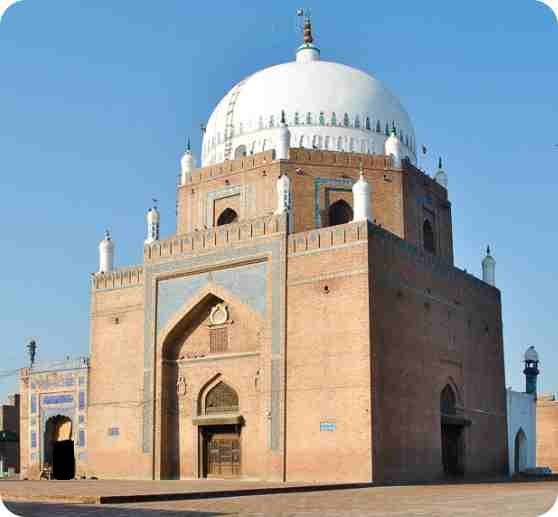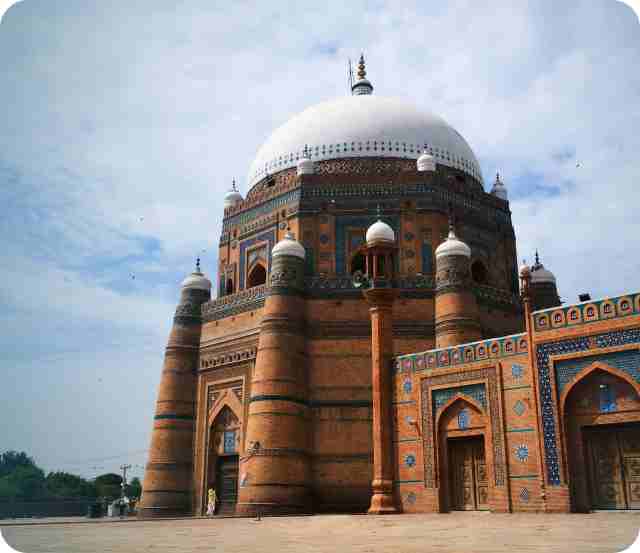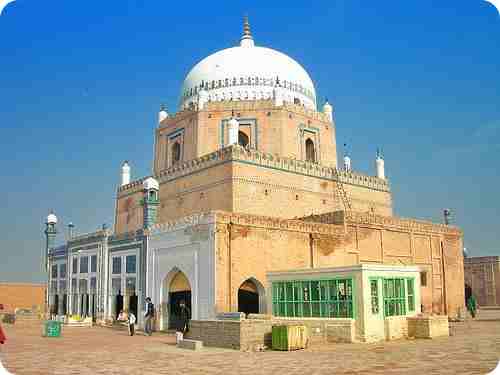8 Most Famous Sufi Saints of Multan
Exploring the Spiritual Legacy: 8 Most Famous Sufi Saints of Multan
Multan, a city in the heart of Pakistan, has long been a cradle of rich cultural and spiritual heritage. Its history is interwoven with the stories of mystics, poets, and scholars who have left an indelible mark on the region. Among these luminaries, the Sufi saints stand out for their profound spiritual teachings and the impact they had on the lives of the people.
In this comprehensive exploration, we delve into the lives and legacies of the 8 most famous Sufi saints of Multan.

Bahauddin Zakariya Tomb
1. Hazrat Bahauddin Zakariya
The revered saint, Bahauddin Zakariya, is considered one of the pioneers of Sufism in Multan. Born in 1170, his teachings emphasized love, tolerance, and self-discipline. His Sufi order, known as the Suhrawardiyya, gained immense popularity not only in Multan but throughout the Indian subcontinent. The shrine of Bahauddin Zakariya, located in the heart of Multan, serves as a spiritual focal point, attracting pilgrims seeking solace and guidance.
2. Shah Rukn-e-Alam
Shah Rukn-e-Alam, the grandson of Bahauddin Zakariya, continued the legacy of his esteemed grandfather. Born in 1251, Shah Rukn-e-Alam’s spiritual journey led him to become a prominent Sufi saint. His teachings emphasized the importance of inner purification and devotion to God. The shrine built in his honor is a masterpiece of Multani architecture, a testament to the city’s rich cultural and spiritual heritage.

Shah Rukn e Alam Tomb Shrine Multan Pakistan
3. Hazrat Shah Shams Tabrez [Not Maulana Rumi’s Murhsid]
Hazrat Shah Shams Tabrez, an eminent Sufi saint born in 1196, played a pivotal role in spreading Sufism in Multan. His teachings centered around the concept of divine love and the oneness of God. Known for his ascetic lifestyle and miraculous feats, Hazrat Shah Shams Tabrez’s shrine in Multan remains a sacred place where devotees seek spiritual enlightenment and solace.

Sheikh Bahauddin Zakariya Multani
4. Sheikh Bahauddin Zakariya Multani
A prominent figure in Multani Sufism, Sheikh Bahauddin Zakariya Multani was a disciple of Hazrat Shah Shams Tabrez. Born in 1173, he dedicated his life to the pursuit of spiritual knowledge and service to humanity. His teachings emphasized humility, selflessness, and the importance of inner contemplation. The shrine dedicated to Sheikh Bahauddin Zakariya Multani is a place where seekers gather to connect with the divine and absorb the spiritual energy left by this revered Sufi saint.
5. Khawaja Awais Kagha
Khawaja Awais Kagha, a revered Sufi saint, was known for his simplicity, piety, and unwavering devotion to God. Born in 1160, he spent his life spreading the message of love, compassion, and selflessness. Khawaja Awais Kagha’s shrine in Multan serves as a beacon for those seeking a deeper connection with the divine and a refuge for those in need.
6. Hazrat Shah Yousaf Gardezi
Hazrat Shah Yousaf Gardezi, a prominent Sufi saint born in 1426, made significant contributions to the spiritual landscape of Multan. His teachings emphasized the importance of self-discipline, compassion, and service to humanity. The Gardezis, a famous Sufi order, trace their spiritual lineage to Hazrat Shah Yousaf Gardezi, and his shrine remains a place of spiritual significance in Multan.
7. Shah Shujah Multani
Shah Shujah Multani, born in the 12th century, was a mystic and poet whose verses reflected deep spiritual insights. His poetry focused on the themes of divine love and the mystical journey of the soul. Shah Shujah Multani’s shrine in Multan is a testament to the enduring impact of his spiritual legacy, attracting devotees seeking inspiration and guidance.
8. Hazrat Khawaja Mohammad Din Chishti Multani
Hazrat Khawaja Mohammad Din Chishti Multani, a revered Sufi saint born in the 19th century, continued the tradition of spreading Sufism in Multan. His teachings emphasized the importance of love for God and compassion for all living beings. The Chishtiya order, to which he belonged, gained prominence in Multan, and his shrine remains a center for spiritual reflection and devotion.
Multan, with its rich cultural and spiritual heritage, stands as a testament to the profound impact of Sufism on the region. The lives and teachings of these 8 famous Sufi saints have left an enduring legacy, shaping the spiritual landscape of Multan and inspiring generations of seekers. The shrines and Sufi orders they established continue to be vibrant centers of spiritual activity, attracting devotees from all walks of life. In exploring the lives of these Sufi saints, we gain not only a historical perspective but also a deeper understanding of the spiritual journey that has shaped Multan into a city of profound significance in the mystical traditions of Islam.



